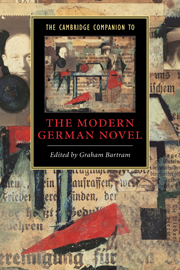Book contents
- Frontmatter
- 1 The German novel in the long twentieth century
- 2 Contexts of the novel
- 3 The novel in Wilhelmine Germany
- 4 Gender anxiety and the shaping of the self in some modernist writers
- 5 Franz Kafka
- 6 Modernism and the Bildungsroman
- 7 Apocalypse and utopia in the Austrian novel of the 1930s
- 8 Images of the city
- 9 Women writers in the ‘Golden’ Twenties
- 10 The First World War and its aftermath in the German novel
- 11 The German novel during the Third Reich
- 12 History, memory, fiction after the Second World War
- 13 Aesthetics and resistance
- 14 The kleiner Mann and modern times
- 15 The ‘critical’ novel in the GDR
- 16 Identity and authenticity in Swiss and Austrian novels of the postwar era
- 17 Subjectivity and women’s writing of the 1970s and early 1980s
- 18 The postmodern German novel
- Index
- Series List
6 - Modernism and the Bildungsroman
Thomas Mann’s Magic Mountain
Published online by Cambridge University Press: 28 May 2006
- Frontmatter
- 1 The German novel in the long twentieth century
- 2 Contexts of the novel
- 3 The novel in Wilhelmine Germany
- 4 Gender anxiety and the shaping of the self in some modernist writers
- 5 Franz Kafka
- 6 Modernism and the Bildungsroman
- 7 Apocalypse and utopia in the Austrian novel of the 1930s
- 8 Images of the city
- 9 Women writers in the ‘Golden’ Twenties
- 10 The First World War and its aftermath in the German novel
- 11 The German novel during the Third Reich
- 12 History, memory, fiction after the Second World War
- 13 Aesthetics and resistance
- 14 The kleiner Mann and modern times
- 15 The ‘critical’ novel in the GDR
- 16 Identity and authenticity in Swiss and Austrian novels of the postwar era
- 17 Subjectivity and women’s writing of the 1970s and early 1980s
- 18 The postmodern German novel
- Index
- Series List
Summary
Thomas Mann's Der Zauberberg, published in 1924 (the translation The Magic Mountain appeared in 1927) describes how a talented if somewhat simple young bourgeois of Hamburg, Hans Castorp, postpones his internship in a shipbuilding firm in order to visit his cousin Joachim Ziemssen, a patient with tuberculosis in the Berghof sanatorium in Davos. Castorp has planned on a comfortable three-week visit; he ends up staying for seven years, and with him the reader of this magnum opus is confined within the institution and the nearby countryside for hundreds of pages. Yet the copious attention that Mann devotes to life among the moribund and the convalescent - including Castorp who, soon after his arrival, is diagnosed with a not inconsequential problem in his lungs - does not produce a novel which one could accurately describe as being 'about' a sanatorium. On the contrary, The Magic Mountain is about Castorp's growth and transformation, his 'heightening' or 'transsubstantiation', to use the novel's own categorical terms, in a context, the sanatorium, populated by an array of characters constituting an allegory of European culture on the eve of the First World War. It is, in other words, about Castorp's education and can therefore be usefully discussed within the tradition of the novel of education, the German Bildungsroman.
- Type
- Chapter
- Information
- The Cambridge Companion to the Modern German Novel , pp. 77 - 92Publisher: Cambridge University PressPrint publication year: 2004
- 2
- Cited by



